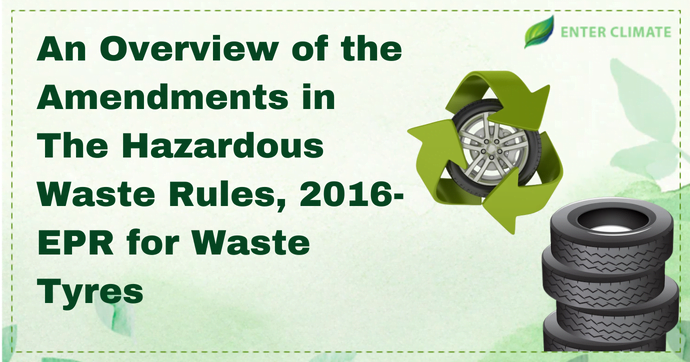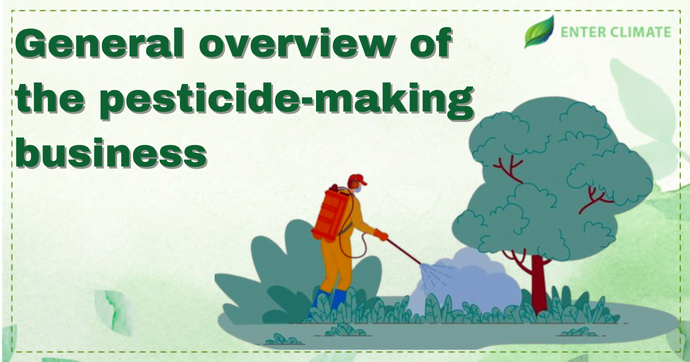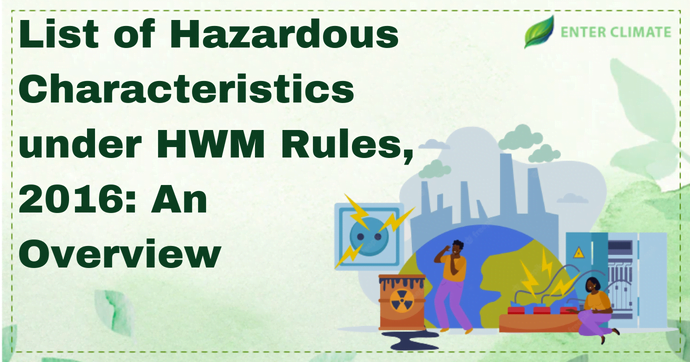An Overview of the Amendments in the hazardous waste rules, 2016-EPR for waste tyres
 22 Nov, 2022
22 Nov, 2022 
In July 2022, MoEF&CC published the Hazardous and Other Wastes (Management and Transboundary Movement) Amendment Rules, 2022, which brought the producers, recyclers and re-treaders of tyres under the extended producer responsibility, an obligation already made mandatory for PIBOs in case of e-waste, battery waste and plastic waste in the country. The EPR for waste tyres apply to the stakeholders in the tyre business, i.e. producers, waste tyre recyclers, and re-dealers and impose obligations on them such as registration and EPR targets. After the amendment of the rules, the producers of new tyres have been assigned the responsibility to recycle specific quantities of waste tyres each year that will be calculated upon the weight of new tyres that they had manufactured in the previous year. In the case of importers of waste tyres, the EPR obligation will amount to 100 % of the waste tyres they have imported in the last year. However, in the ‘ case of re-treaders, the EPR obligation on the waste tyre has been deferred for one year, i.e. 2023. In addition to these changes, provisions for levying environmental compensation have been introduced. Continue reading the article to get a complete analysis of the amended provisions in the EPR for waste tyres.
Changes Brought by the amendment Rules
The amendment dictates the following changes to the HWM Rules concerning EPR for Waste Tyres in the country.
Registration Process
The “entities”(i.e. producer, recycler of waste tyres and re-treader)must register on a Centralised portal developed by the CPCB before commencing or continuing their business from now on. Also, these registered entities must not deal with unregistered producers or recyclers.
EPR obligations
EPR obligations on the producers (manufacturers and importers) of new tyres/ imported used tyres have been introduced. The rules w.r.t EPR has been bifurcated based on the entity registering on the CPCB portal, i.e.
a) For producers (i.e. manufacturers/ importers of new tyres) – The EPR obligation as per the EPR for waste tyres has been tabulated below
| Sr. No. | Year | Waste Tyre Recycling Target in Weight (Kilogram or Tons) |
| (i) | EPR obligation of the year 2022-2023 (the year in which this Schedule comes into force) | 35% of the quantity of new manufactured or tyres imported in year 2020-2021 |
| (ii) | EPR obligation for the year 2023-2024 | 70% of the quantity of new manufactured or tyres imported in year 2021-2022 |
| (iii) | EPR obligation of the year 2024-2025 | 100% of the quantity of new manufactured or tyres imported in year 2022-2023. |
| (iv) | After the year 2024-2025 (year Y), the extended producer responsibility obligation shall be 100% of the quantity of new tyres manufactured or imported in the year (Y-2). | |
| (v) | For units established after the 1st April 2022, the extended producer responsibility obligation shall start after two years (Y) and shall be 100% of the new tyres manufactured or imported in the year (Y-2). |
b) For waste-tyre importers
The EPR for waste tyre importers in the current year will be 100% of the weight of tyres imported in the previous year. Also, the import of waste tyres to produce pyrolysis oil or char has been prohibited.
Retreading of Waste Tyre
Retreading of waste tyres will be allowed, and the re-treader will have to register on the portal to issue retreading certificates. Production of this certificate will lead to deferring EPR obligation, in this case by one year, subject to certain conditions.
Environmental Compensation under the Amendment
Central Pollution Control Board[1] will be coming up with guidelines for the imposition and collection of environmental compensation in case of
- On producers in case of non-fulfilment of EPR obligation
- On producers or recyclers in case of using false extended producer responsibility certificate by Issuing false extended producer responsibility certificate and providing incorrect information.
- Any unregistered producers, recyclers and any entity that aids or abets the violation of the provisions of this Schedule
Prosecution: The involved entities will be liable for prosecution under Section 15 of the Environment (P) Act if any incorrect information is provided for obtaining EPR certificates or generating EPR certificates above 5% of the actual waste recycled. Moreover, failing to cooperate in the verification and audit procedures will invite prosecution under the said Act.
Verification and Audit under EPR for waste tyres
The CPCB can verify the compliance of producers or recyclers through inspection and periodic audits, either by itself or through a designated agency. A Steering Committee under CPCB will be formed to oversee the overall implementation of the EPR regime for waste tyres.
Responsibilities of Stakeholders under the Amendment rules
The other key highlight of the 2022 Amendment was defining the responsibilities of the producers and recyclers.
Responsibilities of the Producer
- Fulfilling their EPR obligation through the online purchase of EPR certificates from registered recyclers only.
- Producers must submit EPR certificates online on the centralised portal by filing quarterly returns.
- Producers must file annual and quarterly returns in the forms specified by CPCB on the portal before the end of the month succeeding the quarter to which the return relates.
Responsibilities of the recycler
- The recycler must submit information on the quantity (weight) of waste tyres used and the end product produced after recycling, the EPR certificate sold, and other relevant information on the portal every month.
- Recycler must file annual and quarterly returns through the portal on or before the month succeeding the quarter to which the return relates.
Conclusion
India discards roughly 275,000 tyres each year but does not have a comprehensive plan for them. Over and above it, about 3 million waste tyres are imported for recycling. The CPCB constituted a committee for ‘Circular Economy in Tyre and Rubber Recycling Industry’ in July 2022 to prepare a comprehensive action plan for EPR for waste tyres. This amendment is in line with the Government of India’s vision to promote eco-friendly and responsible waste management in the country. The EPR for waste tyres might seem an added responsibility when the registration, returns and other post compliance are considered. Producers, recyclers and re-treaders can, with proper assistance and guidance from EPR experts, make this transition into this new regime smooth and quick.
Read our Article: Complete details regarding obtaining MoEF permission for the import of used tyres in India
Categories
Latest Post
Air pollution Dispersion Modeling
Natural Disaster Risk Assessment
Endangered Species Protection
Aquifer Recharge Project
Sustainable Sanitation Solutions














